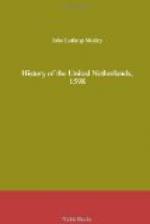Labour was esteemed dishonourable. The Spaniard, from highest to lowest, was proud, ignorant, and lazy. For a people endowed by nature with many noble qualities—courage, temperance, frugality, endurance, quickness of perception; a high sense of honour, a reverence for law—the course of the national history had proved as ingeniously bad a system of general education as could well be invented.
The eternal contests, century after century, upon the soil of Spain between the crescent and the cross, and the remembrance of the ancient days in which Oriental valour and genius had almost extirpated Germanic institutions and Christian faith from the peninsula, had inspired one great portion of the masses with a hatred, amounting almost to insanity, towards every form of religion except the Church of Rome, towards every race of mankind except the Goths and Vandals. Innate reverence for established authority had expanded into an intensity of religious emotion and into a fanaticism of loyalty which caused the anointed monarch leading true believers against infidels to be accepted as a god. The highest industrial and scientific civilization that had been exhibited upon Spanish territory was that of Moors and Jews. When in the course of time those races had been subjugated, massacred, or driven into exile, not only was Spain deprived of its highest intellectual culture and its most productive labour, but intelligence, science, and industry were accounted degrading, because the mark of inferior and detested peoples.
The sentiment of self-esteem, always a national characteristic, assumed an almost ludicrous shape. Not a ragged Biscayan muleteer, not a swineherd of Estremadura, that did not imagine himself a nobleman because he was not of African descent. Not a half-starved, ignorant brigand, gaining his living on the highways and byways by pilfering or assassination, that did not kneel on the church pavement and listen to orisons in an ancient tongue, of which he understood not a syllable, with a sentiment of Christian self-complacency to which Godfrey of Bouillon might have been a stranger. Especially those born towards the northern frontier, and therefore farthest removed from Moorish contamination, were proudest of the purity of their race. To be an Asturian or a Gallician, however bronzed by sun and wind, was to be furnished with positive proof against suspicion of Moorish blood; but the sentiment was universal throughout the peninsula.
It followed as a matter of course that labour of any kind was an impeachment against this gentility of descent. To work was the province of Moors, Jews, and other heretics; of the Marani or accursed, miscreants and descendants of miscreants; of the Sanbeniti or infamous, wretches whose ancestors had been convicted by the Holy Inquisition of listening, however secretly, to the Holy Scriptures as expounded by other lips than those of Roman priests. And it is a remarkable




